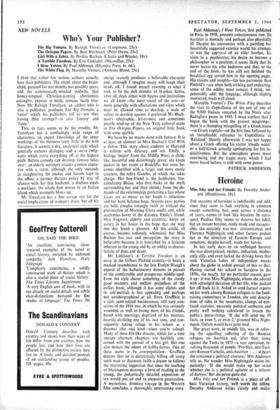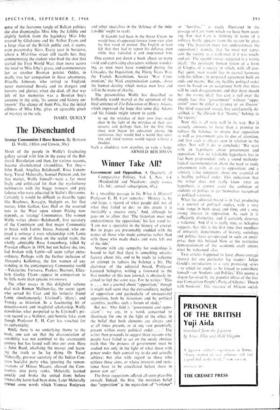Heroine
THE anatomy of heroines is indefinable and odd, since they seem to lack anything in common except something that, seen across a distance of years, comes to look like heroism. In retro- spect, Pauline Irby seems to deserve her label, but an instant heroine, ready-made and recognis- able, she certainly was not: circumstances and Florence Nightingale and other factors pushed her in the direction of Eastern Europe and somehow, despite herself; made her heroic.
In her early days as an unfledged heroine she was disorganised, restless, indiscreet, moder- ately silly, and even lacked the driving force that took Victorian ladies of independent means • about the globe in ardent pursuit of this or that. Having started her school in Sarajevo in the 1870s, she nearly, for no particular reason, gave it up: it was Miss Nightingale, whom she adored with schoolgirl devotion all her life, who packed her off back to it. Asked to send factual reports on her work among Bosnian refugees to the fund- raising committees in London, she sent descrip- tions of rides in the mountains, clumps of con- fused statistics, unseemly political outbursts and pretty well nothing calculated to loosen the public's purse-strings. 'If she will send me 10 facts, or even 5, or even 2,' groaned Miss Night- ingale. Oxfam would have gone mad.
Her great work, in middle life, was in reliev- ing the appalling suffering of the Bosnian refugees on Austrian soil, after their rising against the Turks in 1875—a vast operation, in- volving thousands of people. 'Pro-Slav, anti-Turk, anti-Roman Catholic, anti-Austrian . . . at heart she remained a political creature,' Mrs Anderson tells us. No wonder Miss Nightingale wrote im- patiently: 'If she would make up her mind whether she is a political agitator or a reliever of distress.' But she never quite did.
Miss Irby and her Friends is a piece of off- beat Victorian history, well worth the telling. Dorothy Anderson writes clearly and makes she also disentangles Miss Irby the fallible and slightly foolish from the legendary Miss Irby revered by Gladstone and Sir Arthur Evans and a large slice of the British public and, it seems, even present-day Slays. Every year in Sarajevo, where a Misirbina street still recalls her, they commemorate the student who fired the shot that started the First World War; then move across the road to Miss Irby's grave, and commemorate her as another Bosnian patriot. Odder, in death, was her companion in these adventures, Priscilla Johnson, who retired to England, never mentioned Bosnia and its dangers and horrors and glories; when she died, all that was left of her memories was a Bosnian boy's costume in the attic, 'its source and history un- known.' The silence of Aunt Pris, like the initial silliness of Miss Irby, gives an agreeable pinch































 Previous page
Previous page